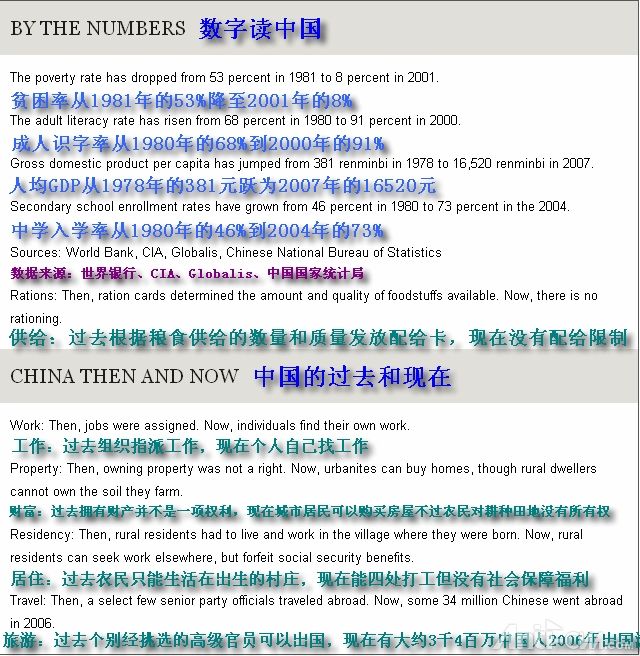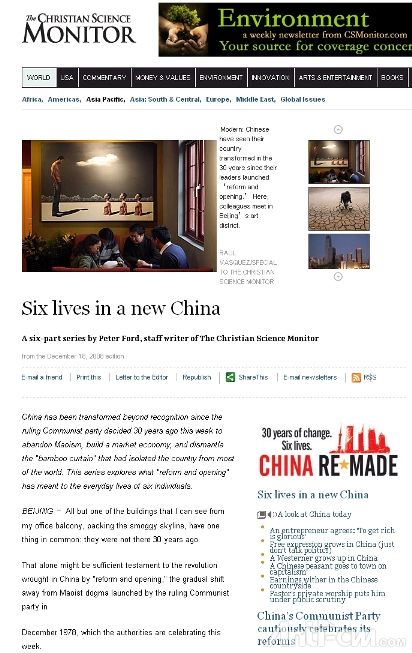【原文标题】Six lives in a new China
【中文标题】一个新中国,六个人生故事
【登载媒体】基督教科学箴言报
【来源地址】http://www.csmonitor.com/2008/1218/p01s01-woap.htm
【译者】荡漾
【声明】本翻译供Anti-CNN使用,转载请注明译者及出处,谢谢!
【译者说明】
 Peter Ford是《基督教科学箴言报》中国报道的“主要劳动力”,时逢中国改革开放30周年《基督教科学箴言报》于12月18日集中刊载了由Peter Ford撰写的系列报道共计8篇。 Peter Ford是《基督教科学箴言报》中国报道的“主要劳动力”,时逢中国改革开放30周年《基督教科学箴言报》于12月18日集中刊载了由Peter Ford撰写的系列报道共计8篇。
此文为该系列报道的首篇,随后是6篇从六个不同的故事看改革开放给人们生活带来变化的系列报道:
·企业家认同“致富光荣”(An entrepreneur agrees: 'To get rich is glorious' )
·(只要不谈政治)中国的言论自由在进步(Free expression grows in China (just don't talk politics) )
·生长在中国的一个西方人 (A Westerner grows up in China )
·一个中国农民走向资本主义化的城市 (A Chinese peasant goes to town on capitalism )
·中国的农村收入微薄 (Earnings wither in the Chinese countryside )
·牧师的个人信仰追求承受着社会监控 (Pastor's private worship puts him under public scrutiny )
【译文】
30年前的这个时候执政共产党决定抛弃毛泽东思想、建立市场经济体制并掀起了将中国与世界隔离开来的“竹帘”,自此中国大地发生的变革超乎人们想像。本系列报道想与读者共同探讨改革开放是如何体现在六个普通人的日常生活中。
站在办公室阳台上视线所及的建筑物笼罩在烟雾缭绕之中,几乎所有的建筑物都有一个共同的特点——30年前并不存在。
这本身就足以证明中国“改革开放”所取得的成就,1878年12月执政共产党决定走出毛泽东的教条主义,本周中国当局庆祝开放30周年。
Russell Leigh Moses是位中国观察家,常年住在中国,他认为中国人民在过去30年来所经历的“心理变化要比肉眼所看见的改变更深刻”。
他表示“现在中国人考虑的是‘可能’、‘可以改变’而不再是‘不可能’”。
过去30年未曾在中国生活过的人难以完全理解中国是以怎样一种令人吃惊的方式在发生改变。邓小平选择了实用主义而不再是意识形态作为政府的指导原则,为新的企业、大量的媒体以及私人财产的引进铺平了道路。
30年前的这个星期中央委员会的官员们一样并不真正明白他们的决定将国家带往何处。邓小平本人曾说过“摸着石头过河”,他的继任者们保持了这样一种谨慎的实践方法。
最关键的是适宜开创的普遍意义上的市场经济释放了前所未闻的1/4世纪以来每年接近2位数的经济增长。来自世界银行的数据称中国的经济发展使6亿人摆脱了贫困。
如果说改革解放了企业的经营思想,那么它实际上则已经扼杀了1949年革命灌输给中国公民的社会大团结的意义。今天的中国是世界上最不平等的国家之一——城市居民的收入比农村地区要高出5倍以上;而联合国的调查结果显示单单就婴儿死亡率这一指标来看,中国穷人家庭要比富人家庭高出7倍。
这值得人们深思。中国当局在马不停蹄发展工业的同时忽略了卫生保健和教育这样的基本社会服务。据官方数据称2004年中国官员公务餐的开支竟然和教育投入相差无几。而对环境的破坏给后人留下的是一笔残酷的遗产。
一边是1.6亿中国人(几乎全都生活在农村)仍然过着1天不足1美元的生活,一边是大多数中国人所享受的生活方式以及拥有诸多的个人选择对他们的父辈来说难以想像。而那些工作的人们的渴望与发达国家的人大同小异。过去消费者想要的耐用品是手表、自行车和缝纫机;今天的年轻人年年换新手机、买新电脑或是存钱买车是无需费心多盘算的。
中国南方一个拥有政府背景的经济智库改革发展研究院院长迟福林认为“大多数人的温饱问题已经基本解决”“现在发展的目标开始越来越关注于人的发展”。
不过中国经济的快速发展突出了政治改革的欠缺。共产主义革命将近60年后执政共产党仍然保持着政治权力的铁腕作风并严令禁止任何人任何行动挑战其垄断地位。
在芝加哥大学教授中国政治的Dali Yang表示之所以共产党能成功做到这一点,既有提高了人民生活标准的原因,也因为当局密切监控着老百姓生活的方方面面。
“以前一切政治化,政治局甚至会开会讨论一盒火柴的涨价问题”“今天政治已有所降温,追求个人生活的自由度则开始升温”。
“这是伴随经济发展而来最大的变化”。

【原文】
(by Peter Ford)
China has been transformed beyond recognition since the ruling Communist party decided 30 years ago this week to abandon Maoism, build a market economy, and dismantle the "bamboo curtain" that had isolated the country from most of the world. This series explores what "reform and opening" has meant to the everyday lives of six individuals.
BEIJING – All but one of the buildings that I can see from my office balcony, packing the smoggy skyline, have one thing in common: they were not there 30 years ago.
That alone might be sufficient testament to the revolution wrought in China by "reform and opening," the gradual shift away from Maoist dogma launched by the ruling Communist party in December 1978, which the authorities are celebrating this week.
But "the visual transformation is not nearly as profound as the psychological transformations" that Chinese citizens have undergone over the past three decades, suggests Russell Leigh Moses, a long-time China watcher here.
"Now," he says, "people think about what is possible, what can be changed, instead of what is not possible."
Nobody who has not lived in China for the last 30 years can hope to fully understand how startlingly the country has changed since Deng Xiaoping made pragmatism, not ideology, the government's guiding principle – paving the way for new enterprises, a flood of new media, and the introduction of private property. Even witnesses to the whole process often look back on the past as if it were another country that they cannot quite believe they lived in.
By the same token, none of the officials at the Central Committee meeting 30 years ago this week can have had any real idea of where they were taking their country. Denghimself said he was "crossing the river by feeling the stones," a cautiously experimental approach his successors have maintained.
Crucially, the fits-and-starts creation of a generally market-led economy has unleashed previously unheard of growth. Expanding by nearly 10 percent a year for a quarter of a century, the Chinese economy has pulled more than 600 million people out of poverty, according to World Bank figures.
If reforms have freed the spirit of enterprise, however, they have stifled the sense of social solidarity that the 1949 revolution meant to instill in China's citizenry. China today is one of the most unequal societies in the world: City dwellers' income is more than five times higher than their country cousins', and infant mortality, to take just one indicator, is seven times higher among poorer Chinese than among the wealthiest, United Nations surveys show.
That is a reflection of how little attention the authorities have paid to basic services such as healthcare and education in their rush for industrial development. Chinese officials spent as much on business meals in 2004 as the government devoted to education, according to official figures. Meanwhile, their carelessness toward the environment is leaving a grim legacy.
But while 160 million people – almost all of them in the countryside – still live on less than a dollar a day, the vast majority of Chinese enjoy a lifestyle, and a range of personal choices, that would have seemed fantastical to their parents. Those in work, however, have aspirations in common with citizens of much richer countries. Where once the acme of consumer durables were a watch, a bicycle, and a sewing machine, today's young urban Chinese think little of changing their mobile phones every year or so, buying a computer or saving for a car.
"The problem of providing enough for the majority of people to eat and wear has basically been solved," says Chi Fulin, head of the China Institute for Reform and Development, a government-backed economic think tank in southern China. Now, he adds, "the goal of development begins to focus more and more on the development of man."
The speed of China's economic development, however, has served to highlight the lack of political reform. Nearly 60 years after the Communist revolution, the ruling party still keeps a tenacious grip on political power and strictly forbids any move to challenge its monopoly.
It has managed to do so, argues Dali Yang, who teaches Chinese politics at the University of Chicago, partly by improving people's standards of living and partly by taking its nose out of every detail of people's lives.
"Before, everything was political," he says. "The Politburo met to discuss raising the price of a box of matches. Today the realm of the political has shrunk, and the realm of liberty in personal lives has grown.
"Along with the economy, that is the greatest change."
【截图】

[ 本帖最后由 荡漾 于 2008-12-18 19:41 编辑 ] |